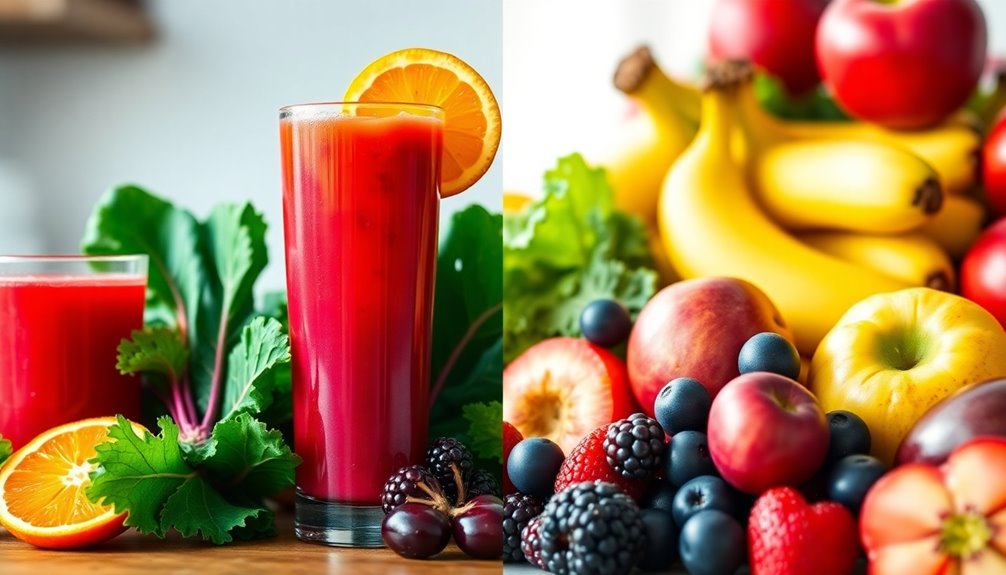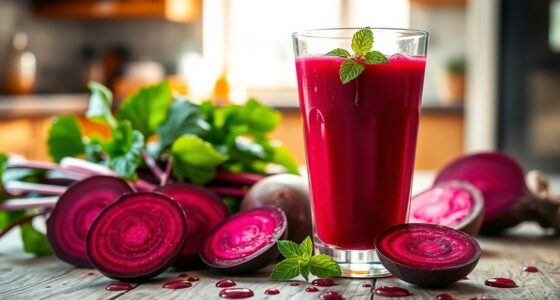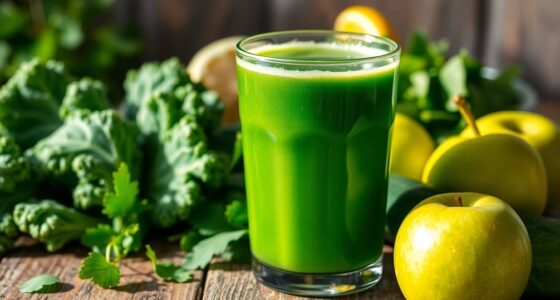Juicing and eating whole fruits both have impressive health perks, but they serve different purposes. Juicing gives you concentrated vitamins and quick hydration, making it great for fast nutrient absorption. However, you miss out on the fiber essential for digestion found in whole fruits. Fiber helps keep you full, stabilizes blood sugar, and lowers chronic disease risks. Want to learn more about how these options compare for your health?
Key Takeaways
- Juicing offers concentrated vitamins and minerals quickly, while whole fruits provide essential fiber that promotes digestion and satiety.
- Whole fruits lower the risk of chronic diseases due to their fiber content, whereas juices can cause rapid blood sugar spikes.
- Juicing may enhance hydration and nutrient absorption, but it lacks the digestive benefits of fiber found in whole fruits.
- Smoothies retain all fruit components, providing higher fiber content and promoting fullness compared to low-fiber juices.
- Consuming whole fruits supports a balanced diet, while excessive juice intake can lead to increased sugar consumption and potential health risks.
Understanding Juicing and Its Popularity
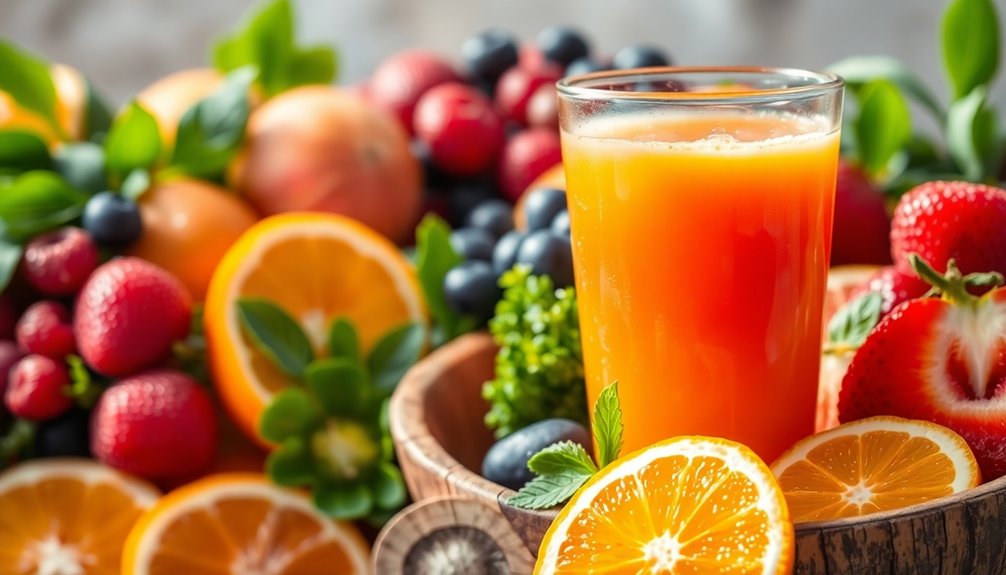
Juicing has become a popular choice for many people looking to boost their health, especially since it allows you to quickly pack in a variety of vitamins and minerals.
Since the 1920s, juicing has evolved into a mainstream trend, particularly in the 1990s, thanks to its perceived health benefits. When you juice, you extract the essence of fresh fruits and vegetables, providing immediate access to essential nutrients. However, this process often means losing out on dietary fiber and other beneficial components found in whole fruits. While juicing offers convenience and can help individuals with digestive issues, it's vital to be mindful of the potential downsides, such as high sugar content and the absence of fiber, which are important for overall health. Additionally, juices like beet juice can provide specific health benefits, such as improved blood flow and increased stamina.
Nutritional Advantages of Juicing
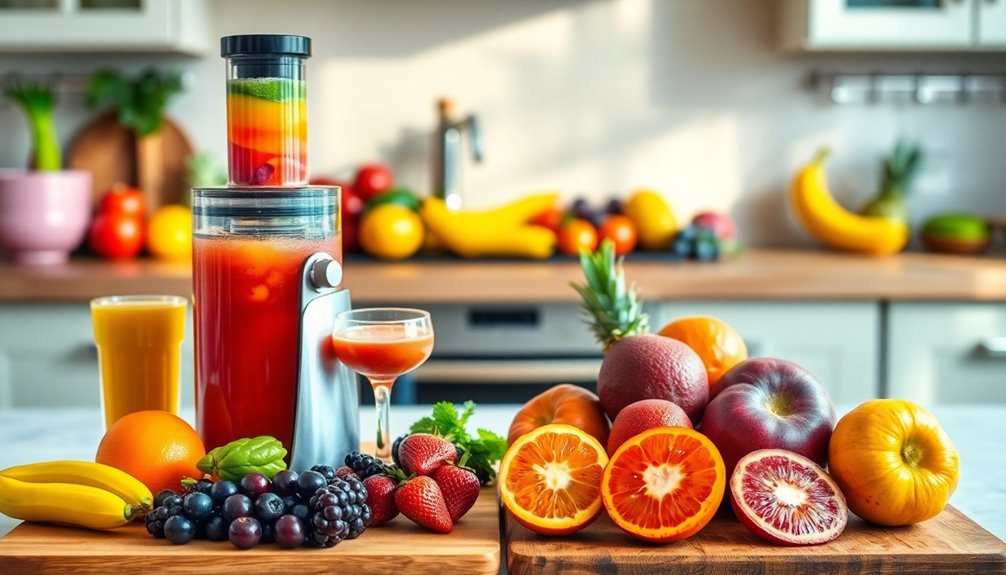
One of the key nutritional advantages of juicing is its ability to deliver concentrated vitamins and minerals quickly. When you juice, you bypass the digestive burden of fiber, allowing your body to absorb nutrients efficiently.
Freshly made juice retains more nutrients than many store-bought options, which often lose their health benefits due to pasteurization. For instance, carrot juice is rich in beta-carotene, essential for eye health.
Leafy green juices are also packed with antioxidants, helping combat oxidative stress and inflammation. Plus, juicing can boost your hydration levels while providing a diverse array of vitamins and minerals from various fruits and vegetables. This concentrated nutrient intake can support your overall health in a convenient way, especially since chia seeds are known for their high fiber content that can aid digestion when consumed. Incorporating leafy green juices into your routine can also enhance weight management efforts due to the low-calorie nature of these drinks. The vegetable juice benefits for weight loss stem from their ability to provide essential nutrients without excessive calories, making them a satisfying option for those looking to shed pounds. Additionally, the hydrating properties and high fiber content of these juices can help curb cravings, keeping you feeling fuller for longer.
Health Benefits of Whole Fruits
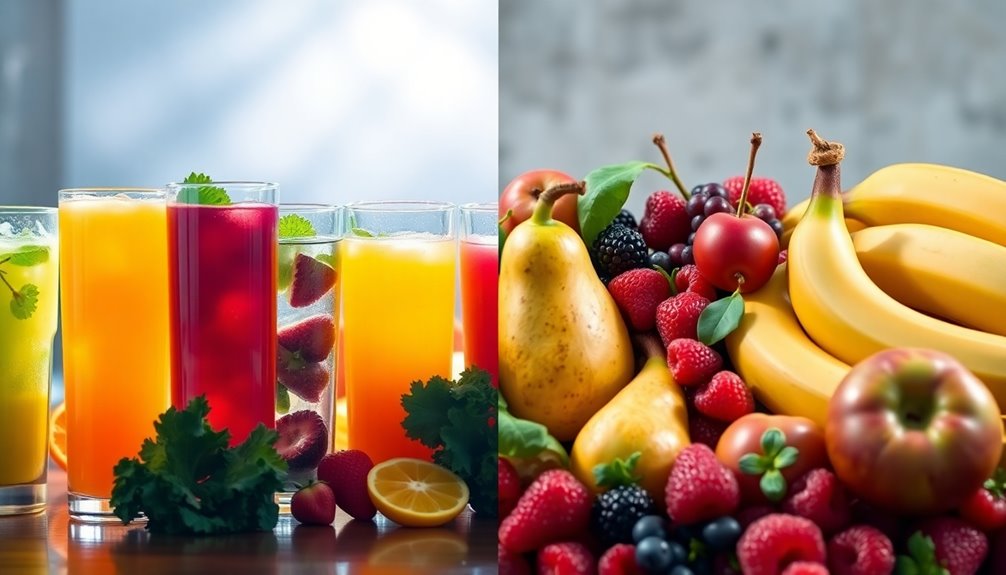
When you choose whole fruits, you're not just getting a tasty snack; you're also packing in nutrients that support your health. Their high fiber content helps with digestion and keeps you feeling full, while the rich nutrient density offers essential vitamins and antioxidants. This makes whole fruits a powerful choice for maintaining your overall well-being. Additionally, whole fruits provide important vitamins that contribute to various bodily functions, enhancing your nutritional intake even further.
Nutrient Density Comparison
While both juicing and eating whole fruits have their advantages, the nutrient density of whole fruits offers significant health benefits that juicing often can't match. Whole fruits retain essential vitamins, minerals, and phytochemicals that may be lost during juicing.
This higher nutrient density contributes to a lower risk of chronic diseases like diabetes and heart disease. In fact, consuming whole fruits can lower diabetes risk by up to 21% compared to regular juice consumption. Furthermore, the natural fiber in whole fruits not only aids digestion but also promotes satiety, helping you manage your weight better. By choosing whole fruits, you get a balanced intake of nutrients that work together to enhance your overall health. Additionally, incorporating whole fruits into your diet can help diversify your investment portfolio in terms of nutrient variety and health benefits.
Fiber Content Benefits
Eating whole fruits provides a wealth of fiber that plays an essential role in your overall health. The high fiber content in these fruits offers 25 to 38 grams of dietary fiber daily, aiding digestion and promoting a feeling of fullness. This helps regulate blood sugar levels by slowing sugar absorption, which is vital for maintaining stable energy levels. Additionally, the fiber can lower cholesterol, reducing your risk of heart disease and stroke. Whole fruits also contain antioxidants and vitamins, which contribute to overall health and support the body's immune system.
Juicing for Quick Nutrient Absorption
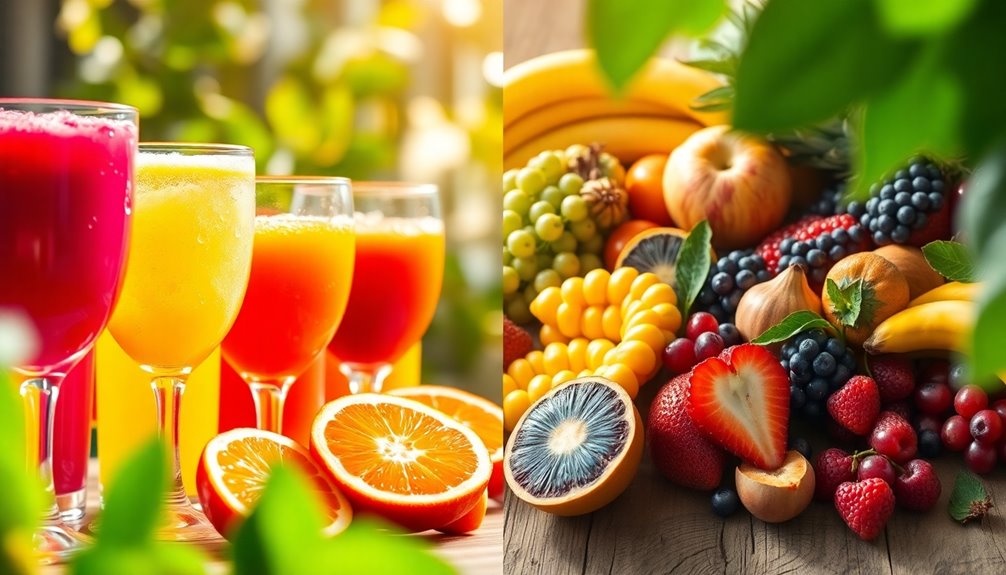
Juicing offers a quick way to get essential nutrients into your system.
By removing the fiber, juices make vitamins and minerals more accessible, especially if you have digestive issues.
This method not only speeds up nutrient delivery but also helps you consume larger quantities of fruits and vegetables effortlessly. Additionally, green juices are high in vitamins that promote immune health and provide antioxidants, enhancing your overall well-being.
Fast Nutrient Delivery
The speed at which your body absorbs nutrients can greatly influence your overall health, and juicing offers a rapid solution. By removing fiber, drinking juice allows for fast nutrient delivery, enabling vitamins and minerals to enter your bloodstream almost immediately.
An 8-ounce glass of freshly made juice can deliver concentrated nutrients from several servings of whole fruits and vegetables, providing you with an instant boost. This quick absorption is particularly beneficial if you have digestive issues, as it helps you uptake nutrients with ease.
Juicing also lets you combine various fruits and vegetables, maximizing your intake of different vitamins and antioxidants in a single serving, making it an excellent addition to a healthy diet. Furthermore, juices can be high in antioxidants, aiding in metabolism and fat burning, thus supporting your overall health goals.
Enhanced Digestion Benefits
While many people struggle with digesting fiber-rich foods, juicing offers a practical solution that enhances nutrient absorption. By removing indigestible fiber, juicing allows for quicker access to vitamins and minerals, making it ideal for those with digestive issues. Fresh juice provides concentrated nutrients without the bulk of whole fruits, helping you consume more fruits and vegetables easily. This can be essential for preventing malnutrition, especially if you're facing dietary restrictions. Additionally, juicing retains beneficial enzymes that assist in digestion, further promoting enhanced digestion. Incorporating natural materials into your diet, such as those found in a Montessori-inspired approach, can also support overall health and well-being.
| Benefits of Juicing | Impact on Digestion | Ideal for Individuals |
|---|---|---|
| Quick nutrient absorption | Reduces digestive strain | With inflammatory bowel diseases |
| Concentrated nutrients | Supports nutrient uptake | Struggling with whole foods |
| Retains beneficial enzymes | Enhances digestion | Facing digestive issues |
The Role of Fiber in Whole Fruits
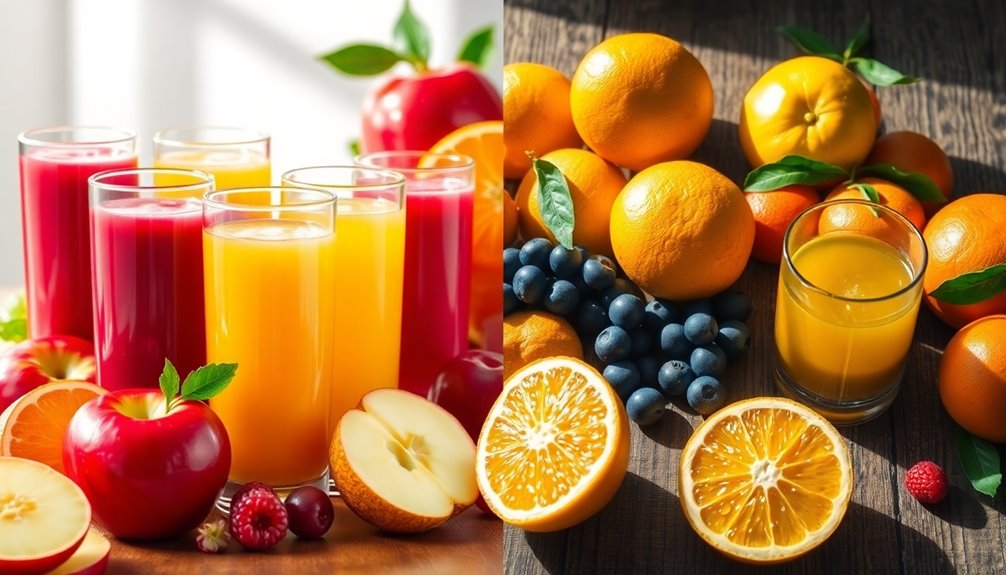
Fiber plays an essential role in the benefits of consuming whole fruits. When you choose whole fruits over juices, you get a substantial boost in fiber that can positively impact your health.
Here are three key benefits of fiber:
- Weight Management: Fiber promotes satiety, helping you control your appetite and reduce overall calorie intake.
- Blood Sugar Regulation: The fiber in whole fruits slows down sugar absorption, preventing rapid spikes in blood sugar levels.
- Heart Health: High fiber intake contributes to better cholesterol levels and reduces inflammation, lowering the risk of chronic diseases. Additionally, a diet high in whole grains can further enhance your fiber intake and support overall wellness.
Potential Risks of Juicing
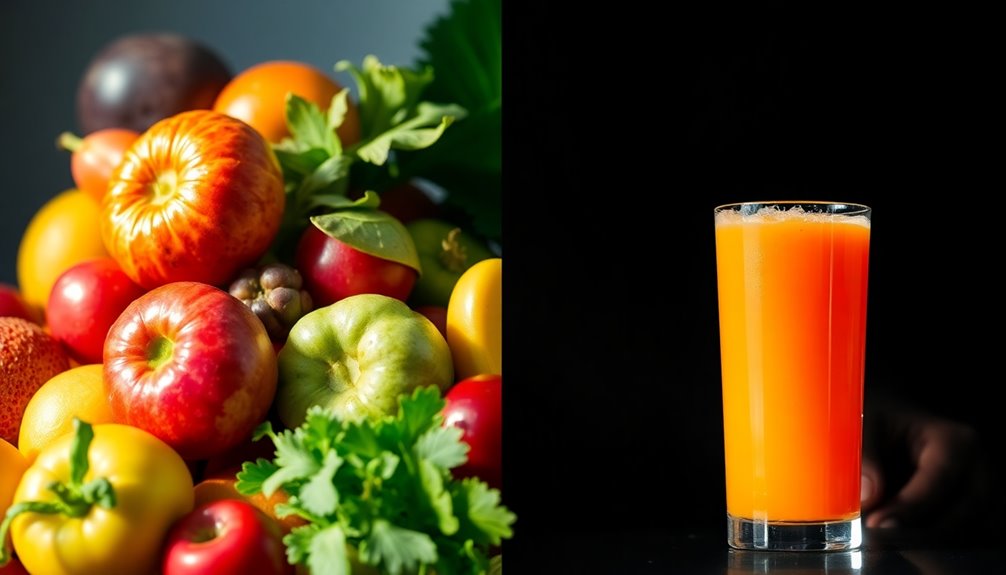
When you juice fruits, you might be surprised by the high sugar content lurking in your glass. Without the fiber found in whole fruits, you could end up feeling hungrier and consuming more calories overall. It's important to reflect on how these factors can impact your health and well-being. Additionally, excessive consumption of juices can lead to gastrointestinal issues similar to those experienced with certain juices like cranberry juice.
High Sugar Content
Juicing might seem like a healthy choice, but it often comes with a hidden downside: high sugar content. Here are three key points to take into account:
- Caloric Intake: An 8-ounce glass of fruit juice can pack 100-180 calories, which may lead to higher calorie consumption compared to whole fruits.
- Blood Sugar Spikes: The high sugar content in fruit juice can cause rapid spikes in blood sugar levels, posing risks for those with diabetes or insulin sensitivity.
- Imbalanced Diet: Regularly drinking fruit juice may increase your sugar intake while lacking essential nutrients found in whole fruits, contributing to an unbalanced diet.
Lack of Fiber
While high sugar content can raise concerns, another significant drawback of juicing is the lack of fiber.
When you juice, you lose the indigestible fiber found in whole fruits and vegetables, which is essential for digestive health. Without this fiber, you might feel hungrier and less satisfied, leading to potential overeating later.
Whole fruits provide essential dietary fiber that helps regulate blood sugar levels, preventing rapid spikes that juices can cause. The daily recommended fiber intake is 25 to 38 grams, but juicing drastically reduces this amount.
Additionally, studies show that diets rich in fiber from whole fruits are linked to lower risks of chronic diseases—a health benefit that juicing simply doesn't offer.
Comparing Juicing and Blending
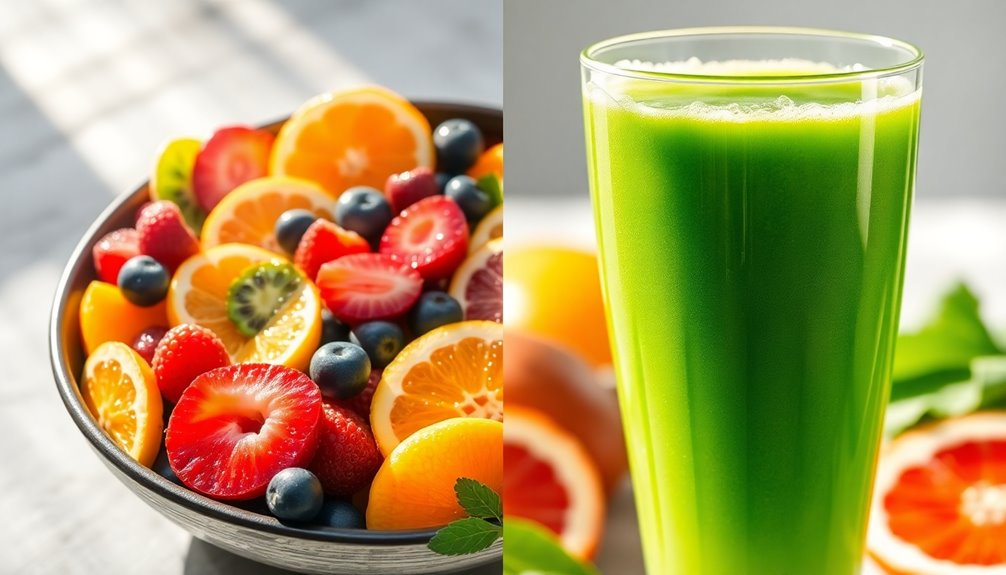
Although both juicing and blending offer unique benefits, they serve different purposes in your diet. Here are three key differences to take into account:
- Fiber Content: Juicing removes pulp, resulting in low fiber drinks, while blending retains all parts of whole fruits, providing higher fiber content.
- Texture and Satiety: Juices are smoother and easier to consume quickly, whereas smoothies can be more filling meal replacements when combined with protein.
- Flavor Masking: Blending can disguise the taste of leafy greens with sweet fruits, encouraging more vegetable intake, while juices often intensify sweetness, potentially increasing sugar consumption.
Ultimately, if you're looking for fiber and nutrient preservation, blending is the way to go.
For quick vitamin boosts, juicing is a convenient option.
Weight Management: Juicing vs. Whole Fruits
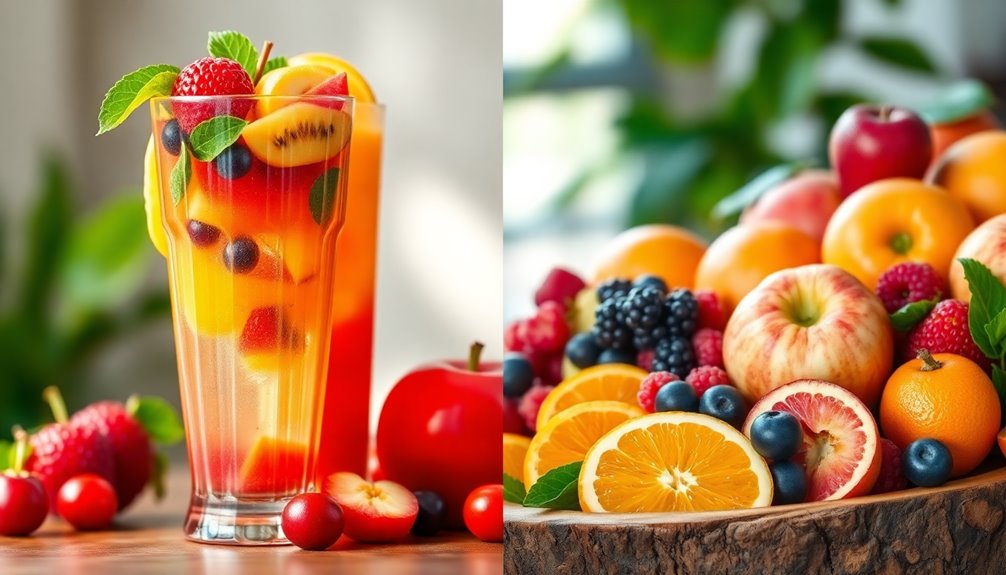
Choosing between juicing and consuming whole fruits can greatly impact your weight management efforts. Whole fruits are generally lower in calories per serving compared to juices, which can pack 100-180 calories into an 8-ounce glass.
The high fiber content in whole fruits aids digestion and promotes a feeling of fullness, helping you regulate your appetite and reduce overall calorie intake. Juicing removes this fiber, often leading to overconsumption of calories as you might drink more juice than you'd eat in whole fruits.
Research shows that diets rich in whole fruits are linked to lower body weight and a reduced risk of obesity. So, incorporating whole fruits into your meals and snacks can be more effective for weight control than juicing.
Impact on Blood Sugar Levels
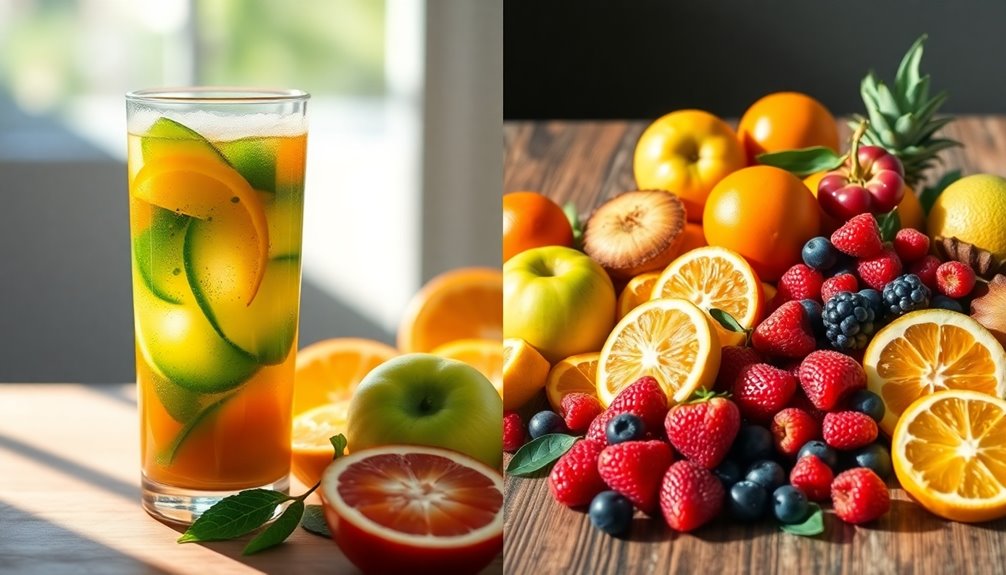
Juicing can lead to rapid spikes in blood sugar levels, making it a less favorable option for those concerned about their glycemic control. Here are some key points to reflect on:
- Fruit juice lacks fiber, which means sugars are absorbed quickly into your bloodstream.
- A Harvard study links daily fruit juice consumption to a 21% increased risk of developing diabetes.
- Eating whole fruits, which contain fiber, can lower your risk of diabetes by 23%.
The impact on blood sugar levels is significant; while fruit juice may seem convenient, it can undermine your health.
Whole fruits, on the other hand, not only provide essential nutrients but also help regulate blood sugar, keeping your levels stable and reducing diabetes risk.
Making Informed Dietary Choices

How do you make informed dietary choices in a world filled with conflicting information?
Start by understanding the differences between whole fruits and drinking juices. Whole fruits are packed with essential dietary fiber, which aids digestion and helps regulate your appetite, promoting satiety.
In contrast, juicing strips away this fiber, leading to quicker nutrient absorption but often leaving you feeling hungrier. Research shows that consuming whole fruits is linked to a lower risk of diabetes, while daily juice intake may increase that risk.
By choosing whole fruits, you gain better health benefits, including more vitamins and minerals.
Frequently Asked Questions
Is It Better to Juice or Just Eat the Fruit?
When deciding whether to juice or just eat fruit, consider your health goals.
Juicing offers quick nutrient absorption, which can be great if you have digestive issues. However, eating whole fruits provides fiber, keeping you full longer and aiding digestion.
Whole fruits also lower your risk of diabetes and help with weight management.
Ultimately, for a balanced diet and better overall health, you're better off munching on the whole fruit.
Is It Better to Drink Fruit Juice or Eat Fruit?
When you're deciding whether to drink fruit juice or eat whole fruit, consider the benefits of each.
Eating whole fruit gives you more fiber, which helps with digestion and keeps your blood sugar stable. You'll also get a wider range of nutrients and feel fuller longer.
While juice can be a tasty treat, it's often higher in sugar and calories, making whole fruits the smarter choice for maintaining your health and weight.
Is Drinking 100% Fruit Juice the Same as Eating Fruit?
No, drinking 100% fruit juice isn't the same as eating whole fruit.
While juice can be tasty and convenient, it lacks the dietary fiber essential for digestion and satiety. Whole fruits provide a broader range of nutrients and phytochemicals that juices often miss.
Additionally, whole fruits help regulate blood sugar levels better than juice, which can spike your blood sugar due to higher sugar content.
What Are 5 Cons of Juicing?
When you consider juicing, there are some notable downsides.
First, you miss out on dietary fiber, which is essential for digestion and appetite control.
Second, juices can be high in calories and sugar, potentially leading to weight gain.
Third, regular juice consumption might increase your diabetes risk due to rapid blood sugar spikes.
Additionally, juices lack protein and healthy fats, which are crucial for balanced nutrition.
Finally, processing fruits reduces beneficial phytochemicals.
Conclusion
In the battle of benefits, both juicing and eating whole fruits have their champions. Imagine a vibrant rainbow of fruits: juicing offers a quick splash of nutrients, while whole fruits provide the sturdy backbone of fiber. Ultimately, you can thrive by choosing the method that fits your lifestyle. Whether you sip or crunch, embracing the goodness of fruits in any form will nourish your body and keep you on the path to wellness. Choose your adventure!
Susannah expertise lies in researching and compiling evidence-based content on juicing, nutrition, and overall health. She is committed to ensuring that The Juicery World offers accurate, up-to-date, and trustworthy information to empower readers to take control of their health. Susannah’s goal is to inspire individuals to embrace juicing as a way to nourish their bodies and live their best lives.

